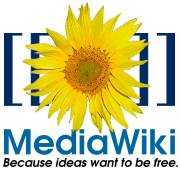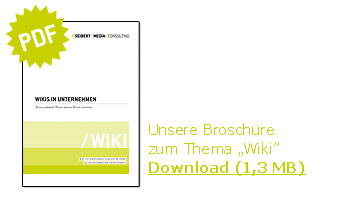Siehe auch den deutschsprachigen Artikel zum Thema.
Wikipedia successful = Intranet successful?
More than two millions of users worldwide are working with the Perl-based wiki system TWiki. This means that the system-oriented TWiki is – next to the article-centered MediaWiki – the most successful as well as the best developed open-source wiki for use in corporate intranets. However, TWiki has maintained a low profile in the larger media, and many managers have not yet recognized the potential of this powerful application.
The software used for Wikipedia is MediaWiki, and that is a killer argument for this application. Managers see the success of the web lexicon and conclude:
“If Wikipedia is this successful, then we need merely use this software and we will also be successful.”
However, this is false logic.
A company wiki is not a web lexicon
MediaWiki was developed exclusively for Wikipedia and its needs. The demands of a web encyclopedia are focused on articles. A company does not need a lexicon; rather, it needs a complement to the intranet – a 
A further argument for MediaWiki is its protection against vandalism. Indeed, changes can quickly be removed, and different versions of documents can easily be compared with each other. Yet, the threat of vandalism is only a pseudo-argument. Protection mechanisms may be sensible for a web lexicon, but they are simply unnecessary in a company wiki. Every change is linked to the IP address of the computer from which the modification was performed. In addition, most employees are logged in to the intranet. Every IP can be personalized by the IT department, and every change can be traced. Therefore, no employee is going to intentionally manipulate documents in a negative way, so the question of vandalism has no relevance in company wikis; in principle, it is nonexistent. Accidental changes can naturally be easily undone: TWiki automatically saves a version of all information and documents and retains each and every modification. Earlier versions can also be reverted to at any time.
Power through a strong community
The strength of TWiki lies in the quantity and – most importantly – the quality of its plug-ins. At this time, there are more than 200 extensions for TWiki that have been developed by companies for companies. Surely there are more extensions for MediaWiki. Still, these have neither the quality nor the development level needed for professional applications in a company – a few of these plug-ins don’t even work correctly or reliably.

Special features of TWiki
The well-documented TWiki, whose parsing engine is programmed in Perl, has a slim core system that works without its own database or even its own data format. Additional functions are added as needed to fit the individual needs, whereby the connection of extensions does not reduce the stability of the core system. The user management of the system is largely automatic and easily allows the connecting of external users (i.e. through LDAP).
All data are organized into webs, topics, and attachments. For this, a web functions as a topic group into which an infinite number of topics can be entered. During the installation, the system automatically prepares the main web, the TWiki Web, and the Sandbox, in which beginners can try out the system. The topics are the single documents of a Web. Besides the topics to be created by employees, there are also a series of standard topics such as TextFormattingRules (with information on formatting possibilities) or WebChanges (with information on changing topics in the Web).
Topics can be hierarchically organized and super- or subordinated to other topics. This is of extreme importance for the structured storage of information. A topic itself consists of the actual text, the revision data, and also additional meta-information in which the author and time of the last revision are contained, and the optional attachments. Attachments can measure up to 10 MB, whereby graphics, pictures, tables etc. can be easily embedded into the text itself. Attachments or topics are not deleted but put into the trash, easily retrievable through the click of a mouse.
Further information:
The TWiki Website
The TWiki Weblog
Why there should be a Wiki integrated into every Intranet
Wikis are the glue holding Intranets together
The second article on the topic of TWiki looks more closely at the use of the application in actual company practice.




